Nursing Assignment: Exploring Nursing Concepts, Theories, and Ethics
VerifiedAdded on 2020/03/04
|10
|2578
|78
Essay
AI Summary
This essay, prepared for a Bachelor of Nursing assignment, provides a comprehensive overview of the nursing profession, its core concepts, and ethical considerations. The student explores the definition of nursing, its roles, and the importance of continuous learning and adherence to ethical and legal guidelines. The assignment examines various nursing theories, with a focus on Orlando's Deliberative Nursing Process Theory, highlighting its relevance in contemporary practice. Furthermore, it discusses the ethical decision-making processes, the New Zealand Nurses Organisation's code of ethics, and the Nursing Council of New Zealand's domains and competencies for registered nurses. The essay also addresses the historical context of nursing in New Zealand, specifically the Treaty of Waitangi and its implications for healthcare, emphasizing the principles of partnership, participation, and protection. The student reflects on the dynamic nature of nursing, the importance of critical thinking, and the multiple aspects of patient care to achieve optimal outcomes.
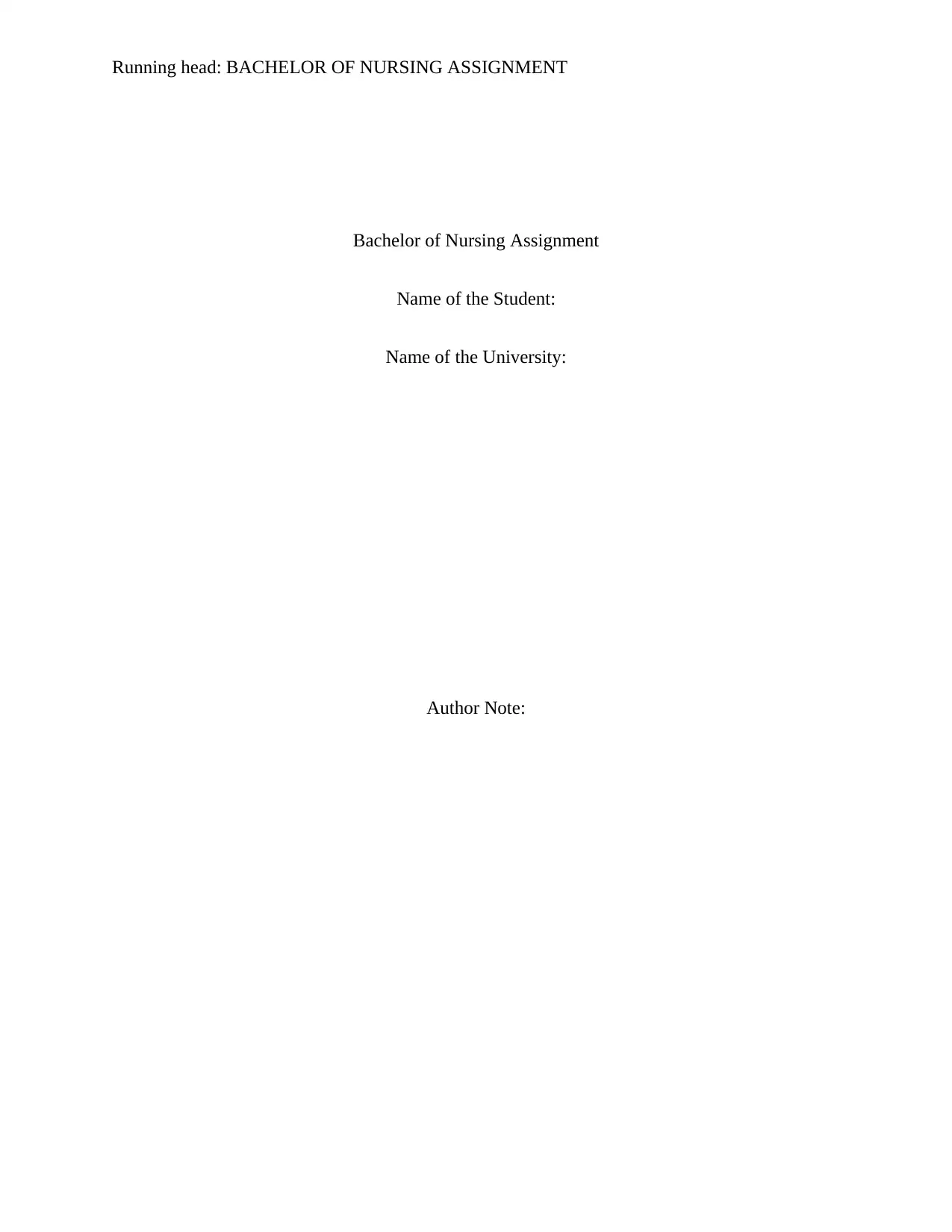
Running head: BACHELOR OF NURSING ASSIGNMENT
Bachelor of Nursing Assignment
Name of the Student:
Name of the University:
Author Note:
Bachelor of Nursing Assignment
Name of the Student:
Name of the University:
Author Note:
Paraphrase This Document
Need a fresh take? Get an instant paraphrase of this document with our AI Paraphraser
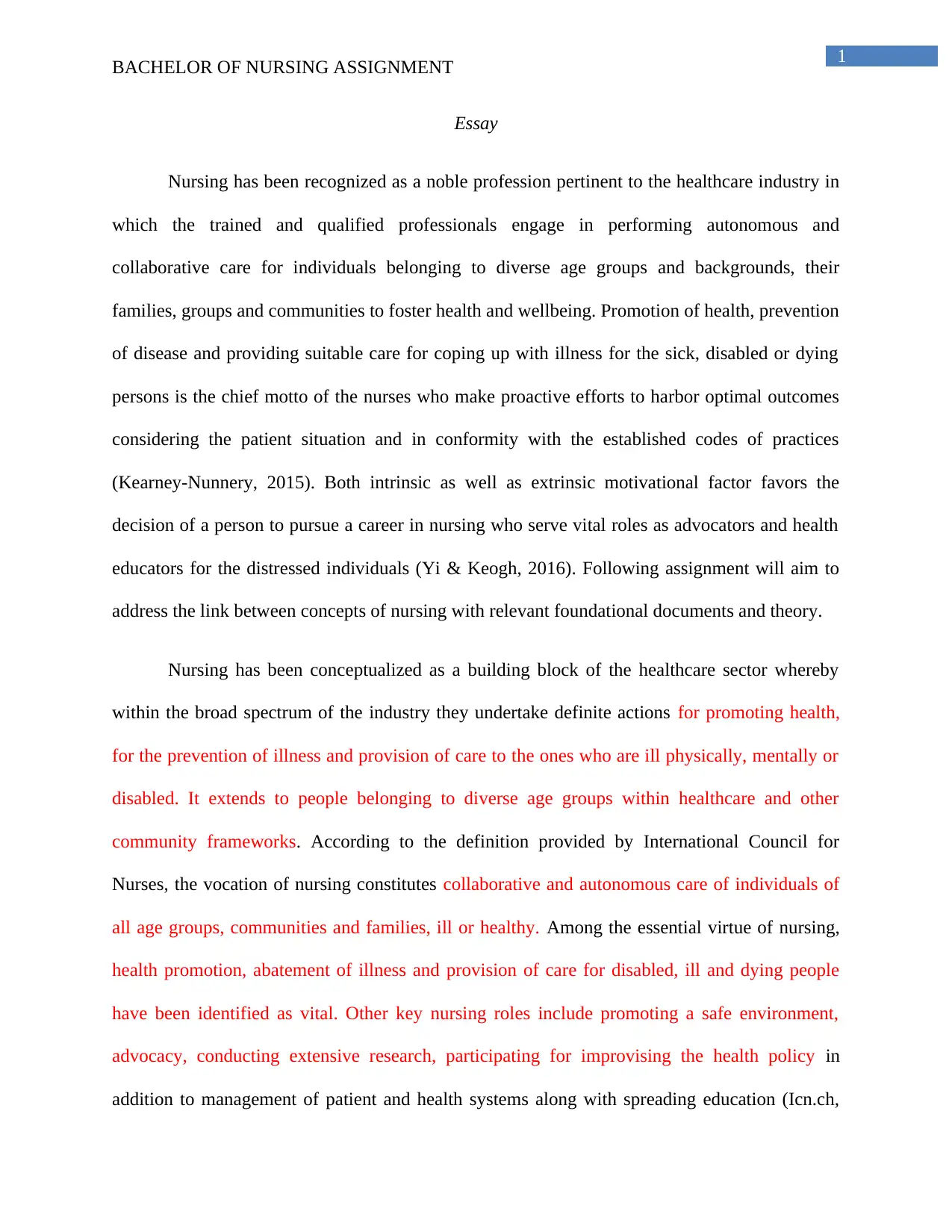
1
BACHELOR OF NURSING ASSIGNMENT
Essay
Nursing has been recognized as a noble profession pertinent to the healthcare industry in
which the trained and qualified professionals engage in performing autonomous and
collaborative care for individuals belonging to diverse age groups and backgrounds, their
families, groups and communities to foster health and wellbeing. Promotion of health, prevention
of disease and providing suitable care for coping up with illness for the sick, disabled or dying
persons is the chief motto of the nurses who make proactive efforts to harbor optimal outcomes
considering the patient situation and in conformity with the established codes of practices
(Kearney-Nunnery, 2015). Both intrinsic as well as extrinsic motivational factor favors the
decision of a person to pursue a career in nursing who serve vital roles as advocators and health
educators for the distressed individuals (Yi & Keogh, 2016). Following assignment will aim to
address the link between concepts of nursing with relevant foundational documents and theory.
Nursing has been conceptualized as a building block of the healthcare sector whereby
within the broad spectrum of the industry they undertake definite actions for promoting health,
for the prevention of illness and provision of care to the ones who are ill physically, mentally or
disabled. It extends to people belonging to diverse age groups within healthcare and other
community frameworks. According to the definition provided by International Council for
Nurses, the vocation of nursing constitutes collaborative and autonomous care of individuals of
all age groups, communities and families, ill or healthy. Among the essential virtue of nursing,
health promotion, abatement of illness and provision of care for disabled, ill and dying people
have been identified as vital. Other key nursing roles include promoting a safe environment,
advocacy, conducting extensive research, participating for improvising the health policy in
addition to management of patient and health systems along with spreading education (Icn.ch,
BACHELOR OF NURSING ASSIGNMENT
Essay
Nursing has been recognized as a noble profession pertinent to the healthcare industry in
which the trained and qualified professionals engage in performing autonomous and
collaborative care for individuals belonging to diverse age groups and backgrounds, their
families, groups and communities to foster health and wellbeing. Promotion of health, prevention
of disease and providing suitable care for coping up with illness for the sick, disabled or dying
persons is the chief motto of the nurses who make proactive efforts to harbor optimal outcomes
considering the patient situation and in conformity with the established codes of practices
(Kearney-Nunnery, 2015). Both intrinsic as well as extrinsic motivational factor favors the
decision of a person to pursue a career in nursing who serve vital roles as advocators and health
educators for the distressed individuals (Yi & Keogh, 2016). Following assignment will aim to
address the link between concepts of nursing with relevant foundational documents and theory.
Nursing has been conceptualized as a building block of the healthcare sector whereby
within the broad spectrum of the industry they undertake definite actions for promoting health,
for the prevention of illness and provision of care to the ones who are ill physically, mentally or
disabled. It extends to people belonging to diverse age groups within healthcare and other
community frameworks. According to the definition provided by International Council for
Nurses, the vocation of nursing constitutes collaborative and autonomous care of individuals of
all age groups, communities and families, ill or healthy. Among the essential virtue of nursing,
health promotion, abatement of illness and provision of care for disabled, ill and dying people
have been identified as vital. Other key nursing roles include promoting a safe environment,
advocacy, conducting extensive research, participating for improvising the health policy in
addition to management of patient and health systems along with spreading education (Icn.ch,
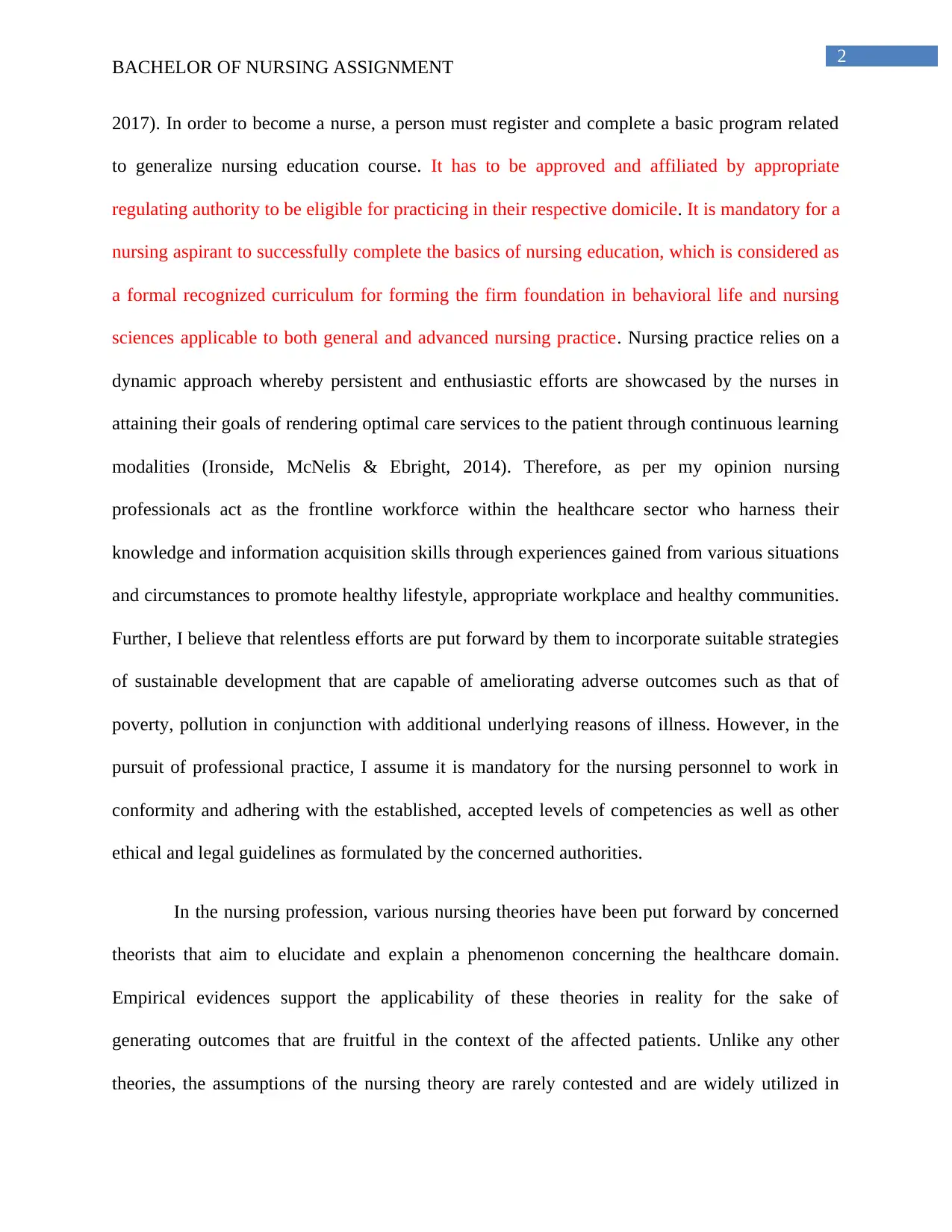
2
BACHELOR OF NURSING ASSIGNMENT
2017). In order to become a nurse, a person must register and complete a basic program related
to generalize nursing education course. It has to be approved and affiliated by appropriate
regulating authority to be eligible for practicing in their respective domicile. It is mandatory for a
nursing aspirant to successfully complete the basics of nursing education, which is considered as
a formal recognized curriculum for forming the firm foundation in behavioral life and nursing
sciences applicable to both general and advanced nursing practice. Nursing practice relies on a
dynamic approach whereby persistent and enthusiastic efforts are showcased by the nurses in
attaining their goals of rendering optimal care services to the patient through continuous learning
modalities (Ironside, McNelis & Ebright, 2014). Therefore, as per my opinion nursing
professionals act as the frontline workforce within the healthcare sector who harness their
knowledge and information acquisition skills through experiences gained from various situations
and circumstances to promote healthy lifestyle, appropriate workplace and healthy communities.
Further, I believe that relentless efforts are put forward by them to incorporate suitable strategies
of sustainable development that are capable of ameliorating adverse outcomes such as that of
poverty, pollution in conjunction with additional underlying reasons of illness. However, in the
pursuit of professional practice, I assume it is mandatory for the nursing personnel to work in
conformity and adhering with the established, accepted levels of competencies as well as other
ethical and legal guidelines as formulated by the concerned authorities.
In the nursing profession, various nursing theories have been put forward by concerned
theorists that aim to elucidate and explain a phenomenon concerning the healthcare domain.
Empirical evidences support the applicability of these theories in reality for the sake of
generating outcomes that are fruitful in the context of the affected patients. Unlike any other
theories, the assumptions of the nursing theory are rarely contested and are widely utilized in
BACHELOR OF NURSING ASSIGNMENT
2017). In order to become a nurse, a person must register and complete a basic program related
to generalize nursing education course. It has to be approved and affiliated by appropriate
regulating authority to be eligible for practicing in their respective domicile. It is mandatory for a
nursing aspirant to successfully complete the basics of nursing education, which is considered as
a formal recognized curriculum for forming the firm foundation in behavioral life and nursing
sciences applicable to both general and advanced nursing practice. Nursing practice relies on a
dynamic approach whereby persistent and enthusiastic efforts are showcased by the nurses in
attaining their goals of rendering optimal care services to the patient through continuous learning
modalities (Ironside, McNelis & Ebright, 2014). Therefore, as per my opinion nursing
professionals act as the frontline workforce within the healthcare sector who harness their
knowledge and information acquisition skills through experiences gained from various situations
and circumstances to promote healthy lifestyle, appropriate workplace and healthy communities.
Further, I believe that relentless efforts are put forward by them to incorporate suitable strategies
of sustainable development that are capable of ameliorating adverse outcomes such as that of
poverty, pollution in conjunction with additional underlying reasons of illness. However, in the
pursuit of professional practice, I assume it is mandatory for the nursing personnel to work in
conformity and adhering with the established, accepted levels of competencies as well as other
ethical and legal guidelines as formulated by the concerned authorities.
In the nursing profession, various nursing theories have been put forward by concerned
theorists that aim to elucidate and explain a phenomenon concerning the healthcare domain.
Empirical evidences support the applicability of these theories in reality for the sake of
generating outcomes that are fruitful in the context of the affected patients. Unlike any other
theories, the assumptions of the nursing theory are rarely contested and are widely utilized in
⊘ This is a preview!⊘
Do you want full access?
Subscribe today to unlock all pages.

Trusted by 1+ million students worldwide
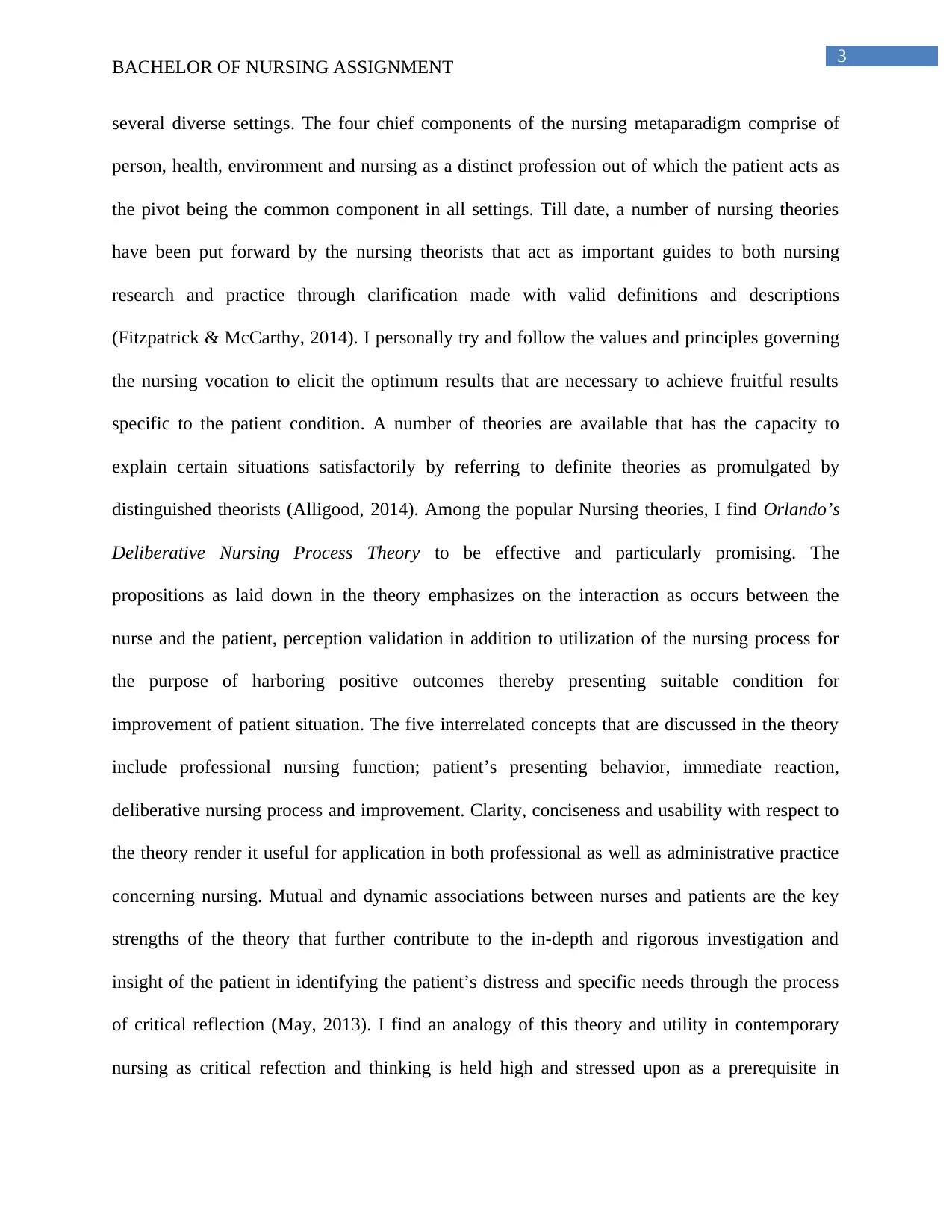
3
BACHELOR OF NURSING ASSIGNMENT
several diverse settings. The four chief components of the nursing metaparadigm comprise of
person, health, environment and nursing as a distinct profession out of which the patient acts as
the pivot being the common component in all settings. Till date, a number of nursing theories
have been put forward by the nursing theorists that act as important guides to both nursing
research and practice through clarification made with valid definitions and descriptions
(Fitzpatrick & McCarthy, 2014). I personally try and follow the values and principles governing
the nursing vocation to elicit the optimum results that are necessary to achieve fruitful results
specific to the patient condition. A number of theories are available that has the capacity to
explain certain situations satisfactorily by referring to definite theories as promulgated by
distinguished theorists (Alligood, 2014). Among the popular Nursing theories, I find Orlando’s
Deliberative Nursing Process Theory to be effective and particularly promising. The
propositions as laid down in the theory emphasizes on the interaction as occurs between the
nurse and the patient, perception validation in addition to utilization of the nursing process for
the purpose of harboring positive outcomes thereby presenting suitable condition for
improvement of patient situation. The five interrelated concepts that are discussed in the theory
include professional nursing function; patient’s presenting behavior, immediate reaction,
deliberative nursing process and improvement. Clarity, conciseness and usability with respect to
the theory render it useful for application in both professional as well as administrative practice
concerning nursing. Mutual and dynamic associations between nurses and patients are the key
strengths of the theory that further contribute to the in-depth and rigorous investigation and
insight of the patient in identifying the patient’s distress and specific needs through the process
of critical reflection (May, 2013). I find an analogy of this theory and utility in contemporary
nursing as critical refection and thinking is held high and stressed upon as a prerequisite in
BACHELOR OF NURSING ASSIGNMENT
several diverse settings. The four chief components of the nursing metaparadigm comprise of
person, health, environment and nursing as a distinct profession out of which the patient acts as
the pivot being the common component in all settings. Till date, a number of nursing theories
have been put forward by the nursing theorists that act as important guides to both nursing
research and practice through clarification made with valid definitions and descriptions
(Fitzpatrick & McCarthy, 2014). I personally try and follow the values and principles governing
the nursing vocation to elicit the optimum results that are necessary to achieve fruitful results
specific to the patient condition. A number of theories are available that has the capacity to
explain certain situations satisfactorily by referring to definite theories as promulgated by
distinguished theorists (Alligood, 2014). Among the popular Nursing theories, I find Orlando’s
Deliberative Nursing Process Theory to be effective and particularly promising. The
propositions as laid down in the theory emphasizes on the interaction as occurs between the
nurse and the patient, perception validation in addition to utilization of the nursing process for
the purpose of harboring positive outcomes thereby presenting suitable condition for
improvement of patient situation. The five interrelated concepts that are discussed in the theory
include professional nursing function; patient’s presenting behavior, immediate reaction,
deliberative nursing process and improvement. Clarity, conciseness and usability with respect to
the theory render it useful for application in both professional as well as administrative practice
concerning nursing. Mutual and dynamic associations between nurses and patients are the key
strengths of the theory that further contribute to the in-depth and rigorous investigation and
insight of the patient in identifying the patient’s distress and specific needs through the process
of critical reflection (May, 2013). I find an analogy of this theory and utility in contemporary
nursing as critical refection and thinking is held high and stressed upon as a prerequisite in
Paraphrase This Document
Need a fresh take? Get an instant paraphrase of this document with our AI Paraphraser
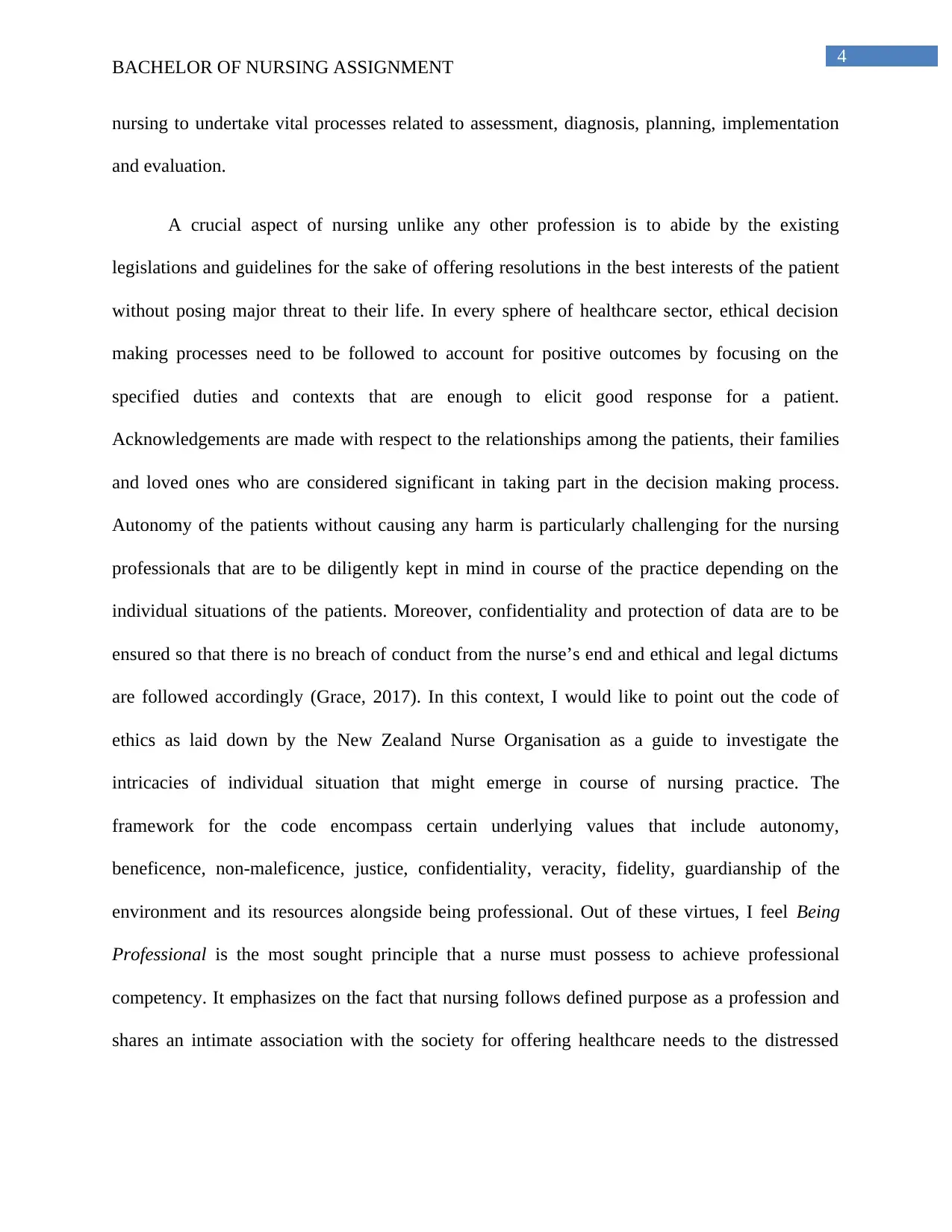
4
BACHELOR OF NURSING ASSIGNMENT
nursing to undertake vital processes related to assessment, diagnosis, planning, implementation
and evaluation.
A crucial aspect of nursing unlike any other profession is to abide by the existing
legislations and guidelines for the sake of offering resolutions in the best interests of the patient
without posing major threat to their life. In every sphere of healthcare sector, ethical decision
making processes need to be followed to account for positive outcomes by focusing on the
specified duties and contexts that are enough to elicit good response for a patient.
Acknowledgements are made with respect to the relationships among the patients, their families
and loved ones who are considered significant in taking part in the decision making process.
Autonomy of the patients without causing any harm is particularly challenging for the nursing
professionals that are to be diligently kept in mind in course of the practice depending on the
individual situations of the patients. Moreover, confidentiality and protection of data are to be
ensured so that there is no breach of conduct from the nurse’s end and ethical and legal dictums
are followed accordingly (Grace, 2017). In this context, I would like to point out the code of
ethics as laid down by the New Zealand Nurse Organisation as a guide to investigate the
intricacies of individual situation that might emerge in course of nursing practice. The
framework for the code encompass certain underlying values that include autonomy,
beneficence, non-maleficence, justice, confidentiality, veracity, fidelity, guardianship of the
environment and its resources alongside being professional. Out of these virtues, I feel Being
Professional is the most sought principle that a nurse must possess to achieve professional
competency. It emphasizes on the fact that nursing follows defined purpose as a profession and
shares an intimate association with the society for offering healthcare needs to the distressed
BACHELOR OF NURSING ASSIGNMENT
nursing to undertake vital processes related to assessment, diagnosis, planning, implementation
and evaluation.
A crucial aspect of nursing unlike any other profession is to abide by the existing
legislations and guidelines for the sake of offering resolutions in the best interests of the patient
without posing major threat to their life. In every sphere of healthcare sector, ethical decision
making processes need to be followed to account for positive outcomes by focusing on the
specified duties and contexts that are enough to elicit good response for a patient.
Acknowledgements are made with respect to the relationships among the patients, their families
and loved ones who are considered significant in taking part in the decision making process.
Autonomy of the patients without causing any harm is particularly challenging for the nursing
professionals that are to be diligently kept in mind in course of the practice depending on the
individual situations of the patients. Moreover, confidentiality and protection of data are to be
ensured so that there is no breach of conduct from the nurse’s end and ethical and legal dictums
are followed accordingly (Grace, 2017). In this context, I would like to point out the code of
ethics as laid down by the New Zealand Nurse Organisation as a guide to investigate the
intricacies of individual situation that might emerge in course of nursing practice. The
framework for the code encompass certain underlying values that include autonomy,
beneficence, non-maleficence, justice, confidentiality, veracity, fidelity, guardianship of the
environment and its resources alongside being professional. Out of these virtues, I feel Being
Professional is the most sought principle that a nurse must possess to achieve professional
competency. It emphasizes on the fact that nursing follows defined purpose as a profession and
shares an intimate association with the society for offering healthcare needs to the distressed
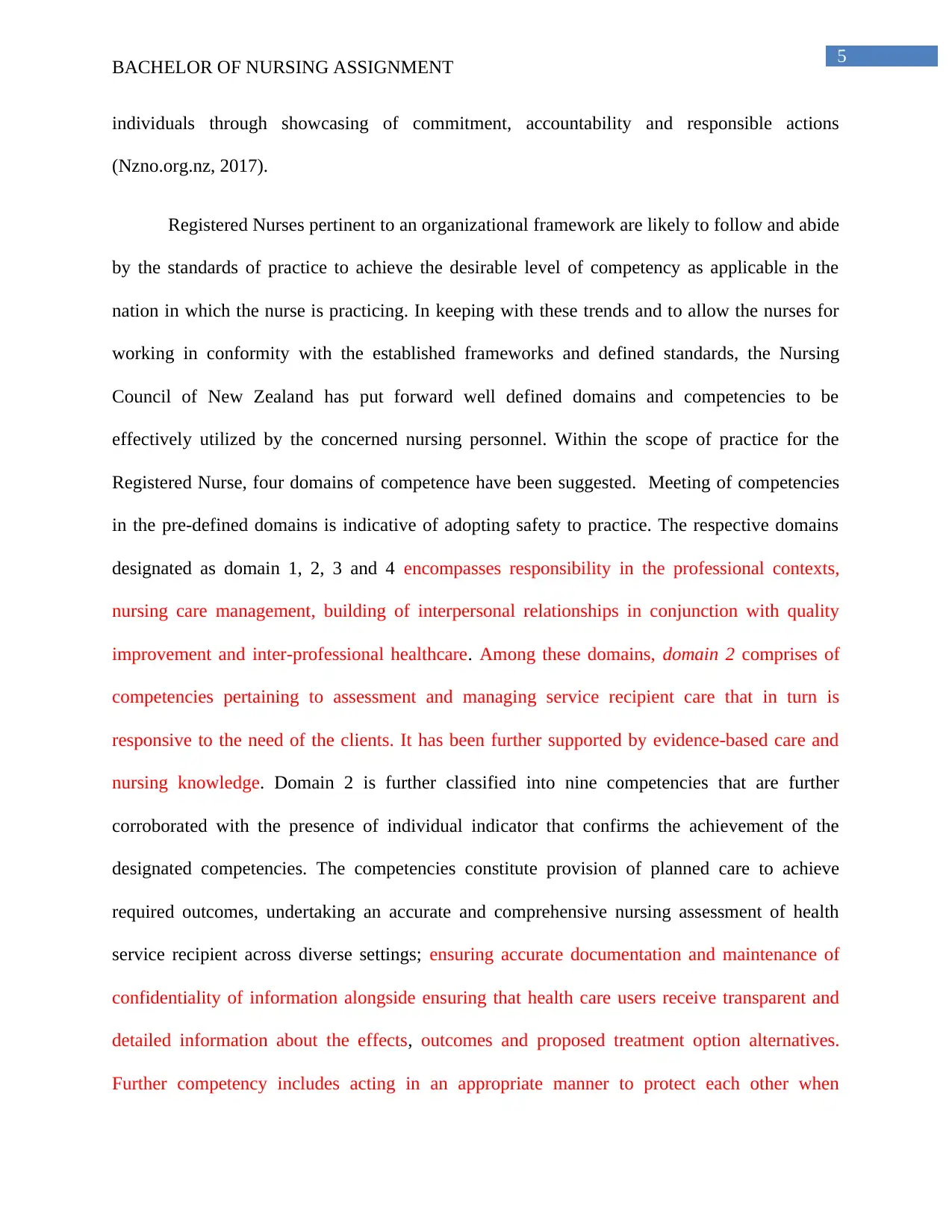
5
BACHELOR OF NURSING ASSIGNMENT
individuals through showcasing of commitment, accountability and responsible actions
(Nzno.org.nz, 2017).
Registered Nurses pertinent to an organizational framework are likely to follow and abide
by the standards of practice to achieve the desirable level of competency as applicable in the
nation in which the nurse is practicing. In keeping with these trends and to allow the nurses for
working in conformity with the established frameworks and defined standards, the Nursing
Council of New Zealand has put forward well defined domains and competencies to be
effectively utilized by the concerned nursing personnel. Within the scope of practice for the
Registered Nurse, four domains of competence have been suggested. Meeting of competencies
in the pre-defined domains is indicative of adopting safety to practice. The respective domains
designated as domain 1, 2, 3 and 4 encompasses responsibility in the professional contexts,
nursing care management, building of interpersonal relationships in conjunction with quality
improvement and inter-professional healthcare. Among these domains, domain 2 comprises of
competencies pertaining to assessment and managing service recipient care that in turn is
responsive to the need of the clients. It has been further supported by evidence-based care and
nursing knowledge. Domain 2 is further classified into nine competencies that are further
corroborated with the presence of individual indicator that confirms the achievement of the
designated competencies. The competencies constitute provision of planned care to achieve
required outcomes, undertaking an accurate and comprehensive nursing assessment of health
service recipient across diverse settings; ensuring accurate documentation and maintenance of
confidentiality of information alongside ensuring that health care users receive transparent and
detailed information about the effects, outcomes and proposed treatment option alternatives.
Further competency includes acting in an appropriate manner to protect each other when
BACHELOR OF NURSING ASSIGNMENT
individuals through showcasing of commitment, accountability and responsible actions
(Nzno.org.nz, 2017).
Registered Nurses pertinent to an organizational framework are likely to follow and abide
by the standards of practice to achieve the desirable level of competency as applicable in the
nation in which the nurse is practicing. In keeping with these trends and to allow the nurses for
working in conformity with the established frameworks and defined standards, the Nursing
Council of New Zealand has put forward well defined domains and competencies to be
effectively utilized by the concerned nursing personnel. Within the scope of practice for the
Registered Nurse, four domains of competence have been suggested. Meeting of competencies
in the pre-defined domains is indicative of adopting safety to practice. The respective domains
designated as domain 1, 2, 3 and 4 encompasses responsibility in the professional contexts,
nursing care management, building of interpersonal relationships in conjunction with quality
improvement and inter-professional healthcare. Among these domains, domain 2 comprises of
competencies pertaining to assessment and managing service recipient care that in turn is
responsive to the need of the clients. It has been further supported by evidence-based care and
nursing knowledge. Domain 2 is further classified into nine competencies that are further
corroborated with the presence of individual indicator that confirms the achievement of the
designated competencies. The competencies constitute provision of planned care to achieve
required outcomes, undertaking an accurate and comprehensive nursing assessment of health
service recipient across diverse settings; ensuring accurate documentation and maintenance of
confidentiality of information alongside ensuring that health care users receive transparent and
detailed information about the effects, outcomes and proposed treatment option alternatives.
Further competency includes acting in an appropriate manner to protect each other when
⊘ This is a preview!⊘
Do you want full access?
Subscribe today to unlock all pages.

Trusted by 1+ million students worldwide
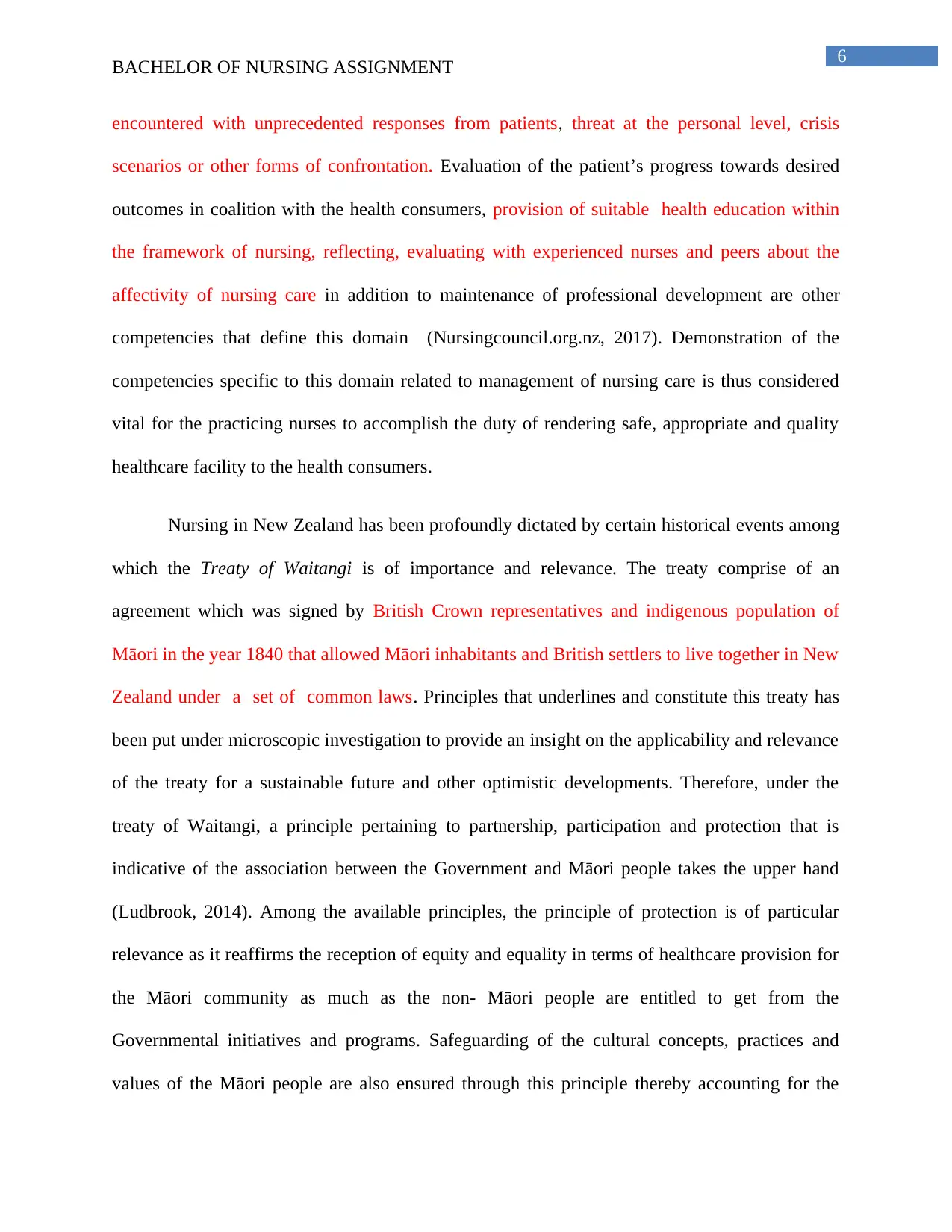
6
BACHELOR OF NURSING ASSIGNMENT
encountered with unprecedented responses from patients, threat at the personal level, crisis
scenarios or other forms of confrontation. Evaluation of the patient’s progress towards desired
outcomes in coalition with the health consumers, provision of suitable health education within
the framework of nursing, reflecting, evaluating with experienced nurses and peers about the
affectivity of nursing care in addition to maintenance of professional development are other
competencies that define this domain (Nursingcouncil.org.nz, 2017). Demonstration of the
competencies specific to this domain related to management of nursing care is thus considered
vital for the practicing nurses to accomplish the duty of rendering safe, appropriate and quality
healthcare facility to the health consumers.
Nursing in New Zealand has been profoundly dictated by certain historical events among
which the Treaty of Waitangi is of importance and relevance. The treaty comprise of an
agreement which was signed by British Crown representatives and indigenous population of
Māori in the year 1840 that allowed Māori inhabitants and British settlers to live together in New
Zealand under a set of common laws. Principles that underlines and constitute this treaty has
been put under microscopic investigation to provide an insight on the applicability and relevance
of the treaty for a sustainable future and other optimistic developments. Therefore, under the
treaty of Waitangi, a principle pertaining to partnership, participation and protection that is
indicative of the association between the Government and Māori people takes the upper hand
(Ludbrook, 2014). Among the available principles, the principle of protection is of particular
relevance as it reaffirms the reception of equity and equality in terms of healthcare provision for
the Māori community as much as the non- Māori people are entitled to get from the
Governmental initiatives and programs. Safeguarding of the cultural concepts, practices and
values of the Māori people are also ensured through this principle thereby accounting for the
BACHELOR OF NURSING ASSIGNMENT
encountered with unprecedented responses from patients, threat at the personal level, crisis
scenarios or other forms of confrontation. Evaluation of the patient’s progress towards desired
outcomes in coalition with the health consumers, provision of suitable health education within
the framework of nursing, reflecting, evaluating with experienced nurses and peers about the
affectivity of nursing care in addition to maintenance of professional development are other
competencies that define this domain (Nursingcouncil.org.nz, 2017). Demonstration of the
competencies specific to this domain related to management of nursing care is thus considered
vital for the practicing nurses to accomplish the duty of rendering safe, appropriate and quality
healthcare facility to the health consumers.
Nursing in New Zealand has been profoundly dictated by certain historical events among
which the Treaty of Waitangi is of importance and relevance. The treaty comprise of an
agreement which was signed by British Crown representatives and indigenous population of
Māori in the year 1840 that allowed Māori inhabitants and British settlers to live together in New
Zealand under a set of common laws. Principles that underlines and constitute this treaty has
been put under microscopic investigation to provide an insight on the applicability and relevance
of the treaty for a sustainable future and other optimistic developments. Therefore, under the
treaty of Waitangi, a principle pertaining to partnership, participation and protection that is
indicative of the association between the Government and Māori people takes the upper hand
(Ludbrook, 2014). Among the available principles, the principle of protection is of particular
relevance as it reaffirms the reception of equity and equality in terms of healthcare provision for
the Māori community as much as the non- Māori people are entitled to get from the
Governmental initiatives and programs. Safeguarding of the cultural concepts, practices and
values of the Māori people are also ensured through this principle thereby accounting for the
Paraphrase This Document
Need a fresh take? Get an instant paraphrase of this document with our AI Paraphraser
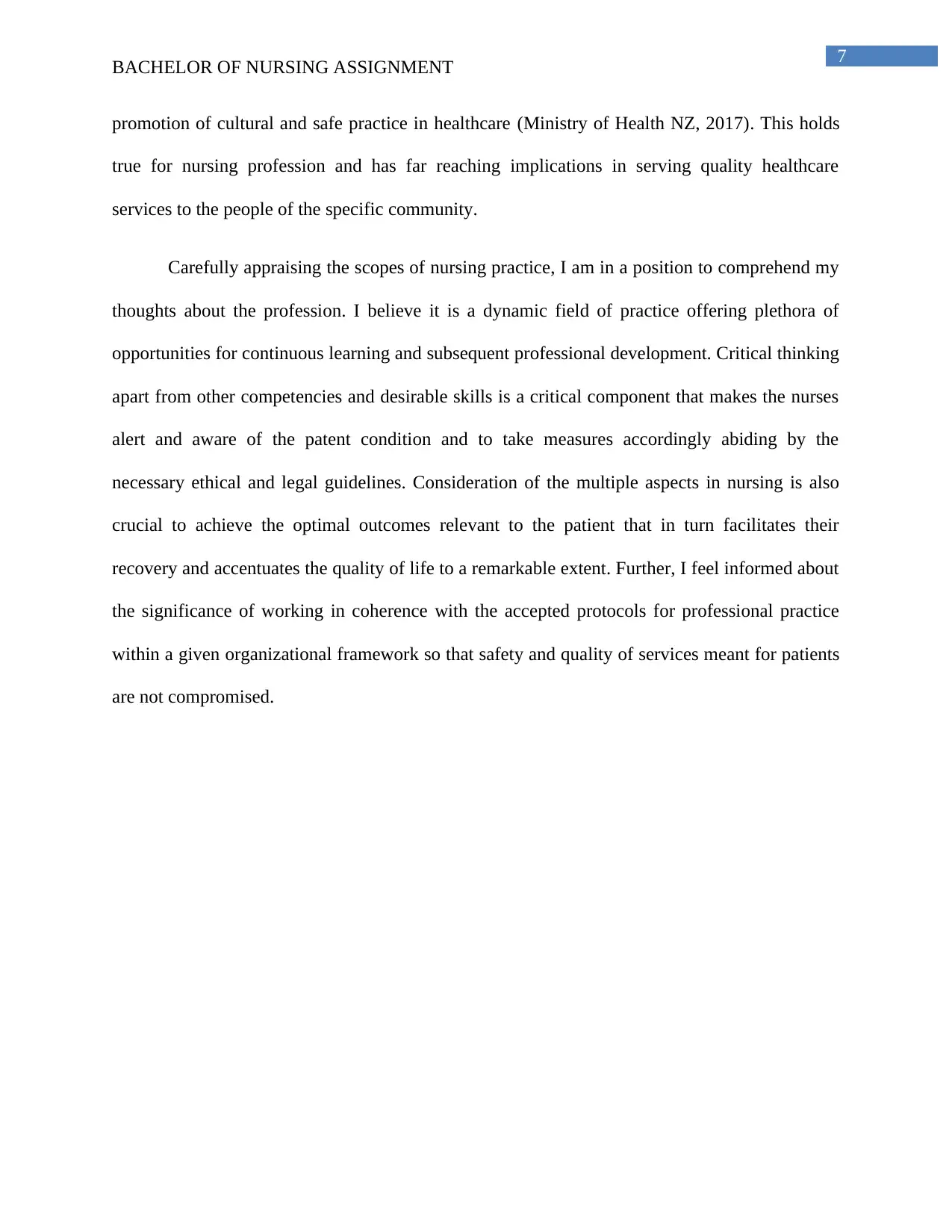
7
BACHELOR OF NURSING ASSIGNMENT
promotion of cultural and safe practice in healthcare (Ministry of Health NZ, 2017). This holds
true for nursing profession and has far reaching implications in serving quality healthcare
services to the people of the specific community.
Carefully appraising the scopes of nursing practice, I am in a position to comprehend my
thoughts about the profession. I believe it is a dynamic field of practice offering plethora of
opportunities for continuous learning and subsequent professional development. Critical thinking
apart from other competencies and desirable skills is a critical component that makes the nurses
alert and aware of the patent condition and to take measures accordingly abiding by the
necessary ethical and legal guidelines. Consideration of the multiple aspects in nursing is also
crucial to achieve the optimal outcomes relevant to the patient that in turn facilitates their
recovery and accentuates the quality of life to a remarkable extent. Further, I feel informed about
the significance of working in coherence with the accepted protocols for professional practice
within a given organizational framework so that safety and quality of services meant for patients
are not compromised.
BACHELOR OF NURSING ASSIGNMENT
promotion of cultural and safe practice in healthcare (Ministry of Health NZ, 2017). This holds
true for nursing profession and has far reaching implications in serving quality healthcare
services to the people of the specific community.
Carefully appraising the scopes of nursing practice, I am in a position to comprehend my
thoughts about the profession. I believe it is a dynamic field of practice offering plethora of
opportunities for continuous learning and subsequent professional development. Critical thinking
apart from other competencies and desirable skills is a critical component that makes the nurses
alert and aware of the patent condition and to take measures accordingly abiding by the
necessary ethical and legal guidelines. Consideration of the multiple aspects in nursing is also
crucial to achieve the optimal outcomes relevant to the patient that in turn facilitates their
recovery and accentuates the quality of life to a remarkable extent. Further, I feel informed about
the significance of working in coherence with the accepted protocols for professional practice
within a given organizational framework so that safety and quality of services meant for patients
are not compromised.
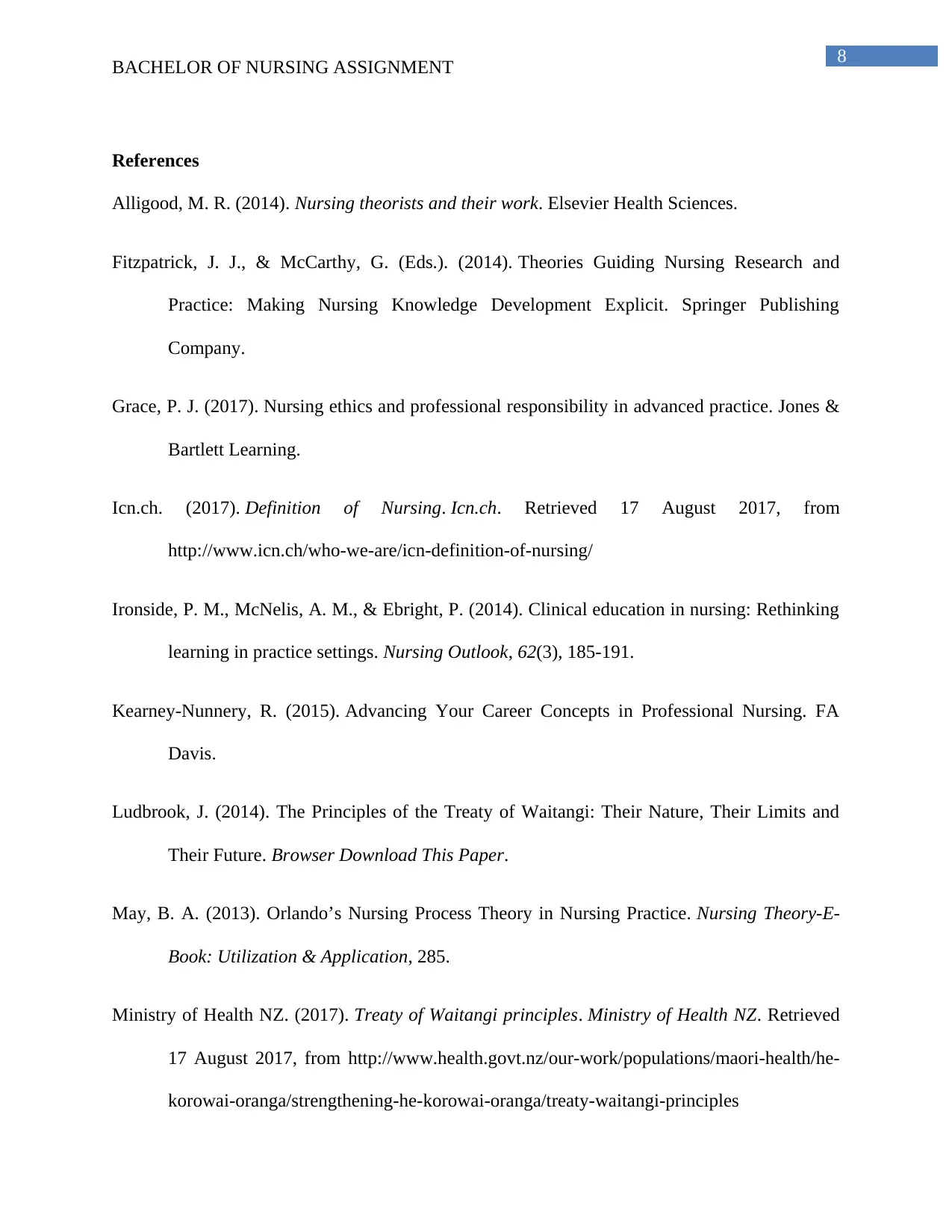
8
BACHELOR OF NURSING ASSIGNMENT
References
Alligood, M. R. (2014). Nursing theorists and their work. Elsevier Health Sciences.
Fitzpatrick, J. J., & McCarthy, G. (Eds.). (2014). Theories Guiding Nursing Research and
Practice: Making Nursing Knowledge Development Explicit. Springer Publishing
Company.
Grace, P. J. (2017). Nursing ethics and professional responsibility in advanced practice. Jones &
Bartlett Learning.
Icn.ch. (2017). Definition of Nursing. Icn.ch. Retrieved 17 August 2017, from
http://www.icn.ch/who-we-are/icn-definition-of-nursing/
Ironside, P. M., McNelis, A. M., & Ebright, P. (2014). Clinical education in nursing: Rethinking
learning in practice settings. Nursing Outlook, 62(3), 185-191.
Kearney-Nunnery, R. (2015). Advancing Your Career Concepts in Professional Nursing. FA
Davis.
Ludbrook, J. (2014). The Principles of the Treaty of Waitangi: Their Nature, Their Limits and
Their Future. Browser Download This Paper.
May, B. A. (2013). Orlando’s Nursing Process Theory in Nursing Practice. Nursing Theory-E-
Book: Utilization & Application, 285.
Ministry of Health NZ. (2017). Treaty of Waitangi principles. Ministry of Health NZ. Retrieved
17 August 2017, from http://www.health.govt.nz/our-work/populations/maori-health/he-
korowai-oranga/strengthening-he-korowai-oranga/treaty-waitangi-principles
BACHELOR OF NURSING ASSIGNMENT
References
Alligood, M. R. (2014). Nursing theorists and their work. Elsevier Health Sciences.
Fitzpatrick, J. J., & McCarthy, G. (Eds.). (2014). Theories Guiding Nursing Research and
Practice: Making Nursing Knowledge Development Explicit. Springer Publishing
Company.
Grace, P. J. (2017). Nursing ethics and professional responsibility in advanced practice. Jones &
Bartlett Learning.
Icn.ch. (2017). Definition of Nursing. Icn.ch. Retrieved 17 August 2017, from
http://www.icn.ch/who-we-are/icn-definition-of-nursing/
Ironside, P. M., McNelis, A. M., & Ebright, P. (2014). Clinical education in nursing: Rethinking
learning in practice settings. Nursing Outlook, 62(3), 185-191.
Kearney-Nunnery, R. (2015). Advancing Your Career Concepts in Professional Nursing. FA
Davis.
Ludbrook, J. (2014). The Principles of the Treaty of Waitangi: Their Nature, Their Limits and
Their Future. Browser Download This Paper.
May, B. A. (2013). Orlando’s Nursing Process Theory in Nursing Practice. Nursing Theory-E-
Book: Utilization & Application, 285.
Ministry of Health NZ. (2017). Treaty of Waitangi principles. Ministry of Health NZ. Retrieved
17 August 2017, from http://www.health.govt.nz/our-work/populations/maori-health/he-
korowai-oranga/strengthening-he-korowai-oranga/treaty-waitangi-principles
⊘ This is a preview!⊘
Do you want full access?
Subscribe today to unlock all pages.

Trusted by 1+ million students worldwide
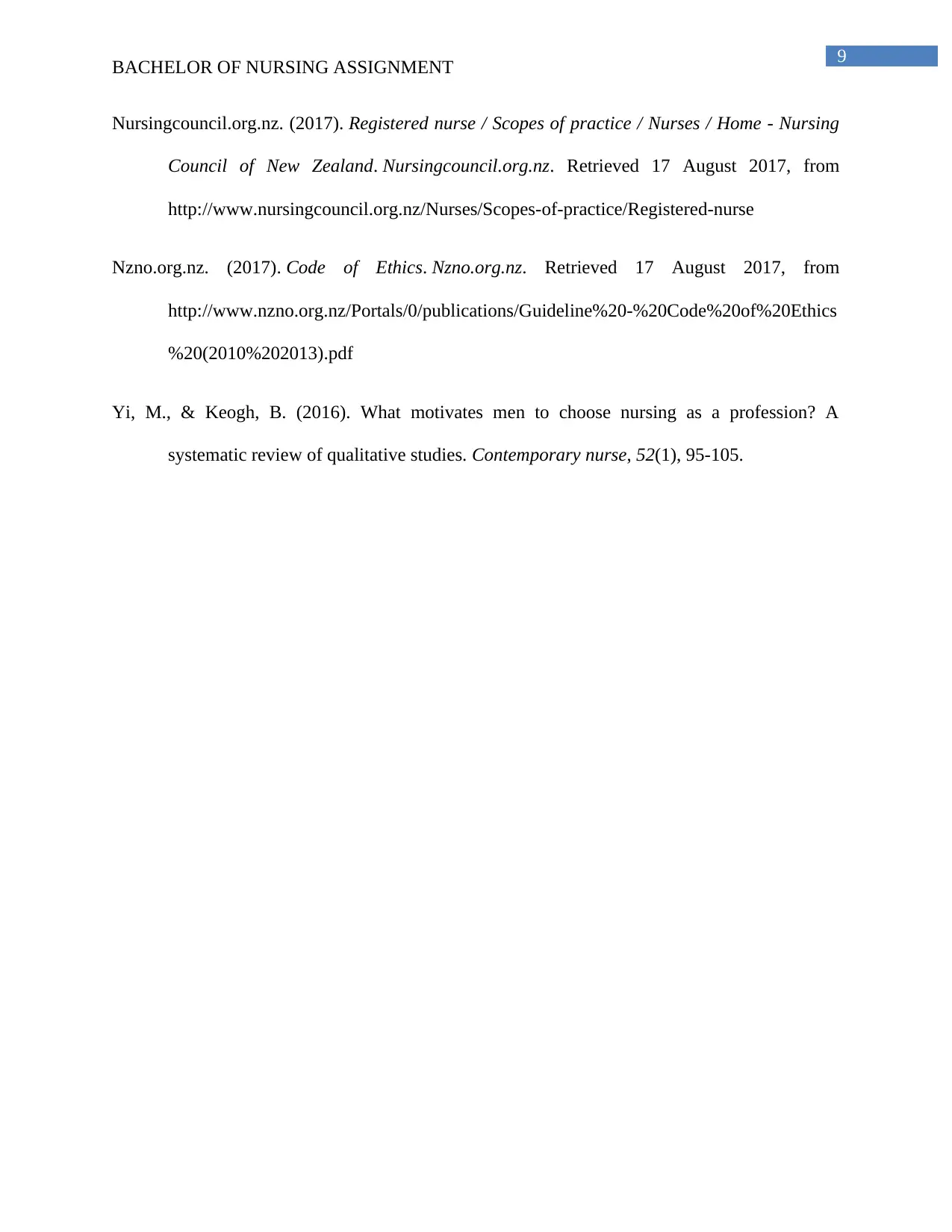
9
BACHELOR OF NURSING ASSIGNMENT
Nursingcouncil.org.nz. (2017). Registered nurse / Scopes of practice / Nurses / Home - Nursing
Council of New Zealand. Nursingcouncil.org.nz. Retrieved 17 August 2017, from
http://www.nursingcouncil.org.nz/Nurses/Scopes-of-practice/Registered-nurse
Nzno.org.nz. (2017). Code of Ethics. Nzno.org.nz. Retrieved 17 August 2017, from
http://www.nzno.org.nz/Portals/0/publications/Guideline%20-%20Code%20of%20Ethics
%20(2010%202013).pdf
Yi, M., & Keogh, B. (2016). What motivates men to choose nursing as a profession? A
systematic review of qualitative studies. Contemporary nurse, 52(1), 95-105.
BACHELOR OF NURSING ASSIGNMENT
Nursingcouncil.org.nz. (2017). Registered nurse / Scopes of practice / Nurses / Home - Nursing
Council of New Zealand. Nursingcouncil.org.nz. Retrieved 17 August 2017, from
http://www.nursingcouncil.org.nz/Nurses/Scopes-of-practice/Registered-nurse
Nzno.org.nz. (2017). Code of Ethics. Nzno.org.nz. Retrieved 17 August 2017, from
http://www.nzno.org.nz/Portals/0/publications/Guideline%20-%20Code%20of%20Ethics
%20(2010%202013).pdf
Yi, M., & Keogh, B. (2016). What motivates men to choose nursing as a profession? A
systematic review of qualitative studies. Contemporary nurse, 52(1), 95-105.
1 out of 10
Related Documents
Your All-in-One AI-Powered Toolkit for Academic Success.
+13062052269
info@desklib.com
Available 24*7 on WhatsApp / Email
![[object Object]](/_next/static/media/star-bottom.7253800d.svg)
Unlock your academic potential
Copyright © 2020–2026 A2Z Services. All Rights Reserved. Developed and managed by ZUCOL.





